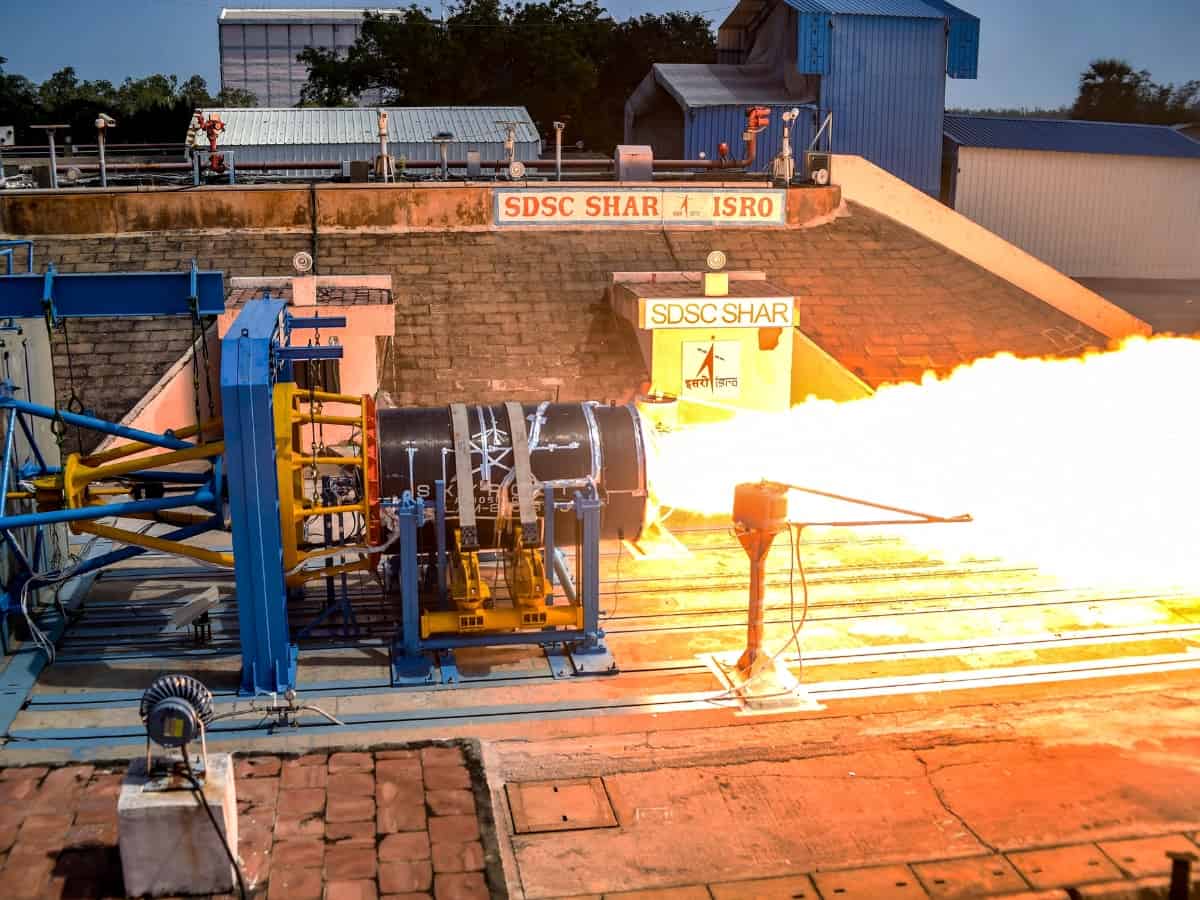
Skyroot Aerospace, the Hyderabad-based, space startup had moved one step closer to realising the development of its Vikram-1 launch vehicle. Vikram-1, expected to be ready by end of 2024 will be the first, orbital launch vehicle from the Indian private sector.
On March 27, Skyroot Aerospace scientists have successfully test-fired the Stage-2 of the Launch Vehicle called Kalam-250, at the Satish Dhawan Space Centre (SDSC) in Sriharikota of Andhra Pradesh.
Pawan Chandana, Co-Founder and CEO stated, “This is a significant milestone for the Indian space industry, marking the successful test of the largest propulsion system ever designed and manufactured by the Indian private sector so far, and the first carbon- composite-built motor tested at ISRO. All test parameters are within expected bounds, and this achievement takes us another step closer to the upcoming orbital launch of the Vikram-1 rocket.”
The Space start up has already pioneered the sub-orbital launch space in the private sector with the successful demonstration and launch of the Vikram-S in November, 2022 with the help of the ISRO.
Skyroot Aerospace, started in 2018 has raised over $100 million in the last few years. It is among the top startups in space that includes Agnikul Cosmos, Bellatrix Aerospace, Pixxel, Dhruva Space, Exseed Space, Digantara etc.
Kalam-250 & way forward
The Wednesday test of the Stage-2 of Vikram-1, Launch Vehicle which is named Kalam-250 (after former President and India’s missile man, A P J Abdul Kalam) was conducted at the propulsion testbed of the Indian Space Research Organisation (ISRO).
The Stage-2 is a critical stage in the ascent of the launch vehicle, as it propels it from atmospheric phase to the deep vacuum of outer-space. The test which lasted 85 seconds recorded a peak sea-level thrust of 186 kilonewtons (kN), which will translate to a fully expanded vacuum thrust of around 235kN in flight.
The Kalam-250 is a high-strength carbon composite rocket motor, which uses solid fuel and a high-performance Ethylene-Propylene-Diene terpolymers (EPDM) thermal protection system (TPS). The stage houses a carbon ablative flex nozzle along with high- precision electro-mechanical actuators for thrust vector control of the vehicle, which helps the rocket achieve the desired trajectory.
This test also had an important contribution from another centre of ISRO, the Vikram Sarabhai Space Centre (VSSC), Thiruvananthapuram, which supplied its proprietary head-mounted safe arm (HMSA) for the test, used for the safe operation of the rocket stage.
The solid propellant in Kalam-250 was processed by Solar Industries at their unique facility in Nagpur. Skyroot had previously tested Kalam-100, the third stage of Vikram-1, which was test-fired successfully in June 2021.
According to Naga Bharath Daka, Co-Founder and COO of Skyroot, “In this landmark test, we validated the critical system for the launch—the flex nozzle control system—during firing for the first time, making this an important milestone in our journey. We have a few more milestones to cross and are focused on achieving them in the coming months to reach our maiden orbital launch of the Vikram-1 in 2024. We have been steadily progressing on our milestones due the perseverance and dedication of our incredible team, and the excellent support from IN-SPACe and ISRO.”
The Skyroot growth story
Since its establishment in 2018, Skyroot Aerospace has emerged as India’s leading private space-tech company. With 300 plus professionals it has accomplished the simultaneous development and validation of solid, liquid, and cryogenic propulsion technologies. Notably, it has harnessed advanced materials and manufacturing techniques, such as carbon fibre structures, miniaturized avionics, and 3D printed engines.
India’s leading private space-tech company, Skyroot Aerospace has raised an additional $27.5 million, equivalent to Rs 225 crore, in a pre-Series C funding round led by Temasek, a global investment company headquartered in Singapore. The present capital infusion builds upon the company’s previous raise in 2022, bringing its total funding to $ 95 million, which is the largest ever for an Indian Space-tech startup. Skyroot plans to utilize the newly acquired capital to drive its next phase of growth through increased investments in infrastructure, reinforcement of its technology leadership, attraction of top-tier talent, and the enhancement of its launch frequency and capabilities.
In October 2023, Union Minister for Science and Technology, Dr Jitendra Singh inaugurated MAX-Q, a state-of-the-art infrastructure which houses integrated design, manufacturing and testing facilities for the building of space launch vehicles, and design space for the 300-member strong workforce of Skyroot.
The facility which covers a sprawling 60,000 square feet built-up area, with plans for expansion in the near future, is designed and built on a futuristic space theme, which resonates the spirit of Skyroot to democratize space access for the rapid progress of humanity.
With MAX-Q becoming functional, Skyroot’s facilities total four, with a cumulative built-up area of 100,000 square feet, placing it among one of the largest rocket development facilities in the private sector globally, Pawan Chandana said.



